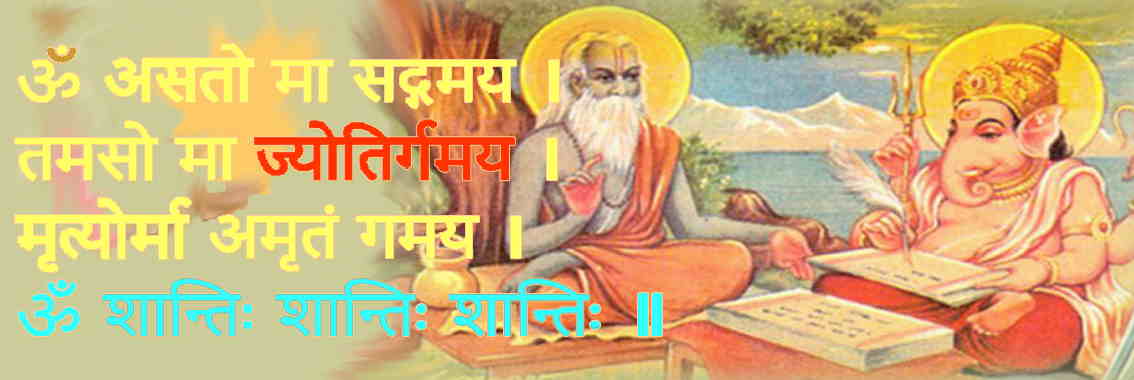Śraddhā – Faith or Confidence?
व्यां वेदव्यासाय नमः
vyāṁ vedavyāsāya namaḥ

Guru Purnima is the occasion to express gratitude to our Guru, mentors and teachers who are illumining our path. This year, it falls on July 24th Saturday in India and on the 23rd in the UK. Two years ago, on this same occasion I wrote about how the importance of observing “Sadhana Chatushtaya” or the four-fold qualification given in Tattva Bodha facilitates learning. https://vijayajyoti.com/guru-purnima/. Being aware of these requirements is a preliminary step in the path of spiritual progress. The more qualifications we gain, the better will be the assimilation of knowledge and the in the practice of it. When there is a conflict in theory and practice, then one must re-visit these qualifications to see what is being not followed. Every year I want to explore one quality in-depth for development as my offering on this day. Last year I explored the importance of quality of Titīkṣa or endurance on this occasion.https://vijayajyoti.com/titiksha-endurance/#more-1073.
This year I want to explore the quality of Śraddhā which is loosely translated as faith in God or religion which is closer in meaning to bhakti. The word is derived from the root dhā – placing, holding or bestowing and śrat – truth – faith arises when we hold what we truly believe in and place it firmly within ourselves.
Defining śraddhā
Śraddhā is defined by Ādi Śaṅkarācāryā in Tattva Bodha ( a basic scripture for a Vedanta Student) as confidence in the Guru and the
words of Vedanta and other scriptures.
गुरुवेदान्तवाक्यादिषु विश्वासः श्रद्धा
The text uses the word viśvāsaḥ which can means confidence, trust, reliance, faith or belief.
Śraddhā is a qualification we need prior to acquiring any knowledge material or spiritual. One needs an open mind before we attempt to understand and gain wisdom and resist from unnecessarily intellectualising or rejecting on the basis that it might be contrary to what we know so far. Here I recount an important verse from Chapter 4 of Bhagavad Gīta where Śrī Kṛṣṇa talks about faith being necessary to attain the highest knowledge and peace.
श्रद्धावान् लभते ज्ञानं तत्पर: संयतेन्द्रिय: |
ज्ञानं लब्ध्वा परां शान्तिमचिरेणाधिगच्छति || 4.39||
The man who is full of faith, who is devoted to It, and who has subdued the senses, obtains (this) ‘knowledge’; and having obtained ‘knowledge’, ere long he goes into the supreme peace.
If Śraddhā is a prequalification for knowledge, then it also follows that it must be innate in all of us. We all begin life by having faith in our parents and the teachers in school. We have confidence that the Sun will rise and set every day. We have faith that we will wake up after we go to sleep. Faith is not a concept of blind belief but it is reinforced by observation and experience and tested in practice. Then again, it is but natural as faith arises and blooms in the heart, then it must also differ on the basis of our quality of our minds.
Chapter 17 of Bhagavad Gīta emphasises that there are three types of Śraddhā based on the gunas of sattva, rajas and tamas. This means that we place and experience faith on different things at different times according to our nature. All our achievements in life are coloured by the type of the faith we have. There are some of us who place faith in the goodness of human beings and believe that we should not grasp everything to our advantage. Then there are others who have faith in achievement, glory and in acquiring and protecting by whatever means what they consider their entitlement and there are those who have faith in doing the least and getting the most out of any activity. We are indeed defined by our beliefs.
त्रिविधा भवति श्रद्धा देहिनां सा स्वभावजा|
सात्त्विकी राजसी चैव तामसी चेति तां शृणु || 17.2||
सत्त्वानुरूपा सर्वस्य श्रद्धा भवति भारत |
श्रद्धामयोऽयं पुरुषो यो यच्छ्रद्ध: स एव स: || 17.3||
Three-fold is the faith of the embodied, which is inherent in their nature- the sāttvic (pure), the rājasic (passionate) and the tāmasic (dark). Thus thou hear of it.
The faith of each is in accordance with his nature, O Bharata. Man consists of his faith; as a man’s faith is, so is he.
The practice of śraddhā
Whatever the chosen path, one needs to place trust and confidence in it to fully experience and evolve in that path. This positive attitude is necessary not only in the start but throughout any activity we undertake till completion. It is but faith that gives us focus and makes us skilful in our action.
Śraddhā is a one of the qualities prescribed to be truly established in the practice of Samadhi (meditation). BKS Iyengar explains in his book Light on Yoga that Śraddhā should not be understood simply as faith and includes mental and intellectual firmness. Any firm practice whatever the field be art, science or philosophy converts the initial trust into faith by direct experience. Trust is said to be instinctive whereas faith is intuitive. Here I am reminded of a quote by Noble Laurate Rabindra Nath Tagore “Faith is the bird that sings when the dawn is still dark”. The allegory here is that faith is represented as a bird which intuitively senses the light even in darkness.
What defeats śraddhā and how to overcome it?
What defeats Śraddhā is saṁśaya – doubt. This doubt can be about oneself or about others or about a situation. It is stated in Bhagavad Gīta verse 4.40 says a person who has neither Śraddhā nor knowledge will not find happiness in this life or anywhere else. That is because one will be plagued by indecision and all efforts will come to naught.
Many a times, our faith is tested when the experience is contrary to our beliefs or expectations. This is because in that moment of uncertainty we are flooded by doubt, negative thoughts and reinforcing patterns which are all part of our script. We become a hostage to our own script and react. Sometimes there is paralyses of thought and action leading to missed opportunities. However one must be steadfast in faith to reach the goals as we may be closer to success than we think we are. Here I share the last verse from a poem I was inspired from an young age – ‘Don’t Quit by Edgar Guest’
Success is failure turned inside out—
The silver tint of the clouds of doubt,
And you never can tell how close you are,
It may be
near when it seems afar;
So stick to the fight when you’re hardest hit—
It’s when things seem worst that you mustn’t quit.
It is often an emotionally agile person who is able to steer and stay in course or to expertly manoeuvre during turbulent times. In psychology the ability to integrate emotional and mental states and remain in focus when in doubt, uncertainty or paradox is called ‘negative capability’ – a term originally coined by the poet John Keats. The concept is also termed as ‘reflective inaction’ – the ability to hold oneself and not carry out an action when things are unfavourable or in half-knowledge. We can succeed in this technique by being more present and self-aware which can be cultivated by the practice of controlled breathing and meditation. The practice of systematic introspection and contemplation can be developed to weed out familiar self-limiting thoughts and patterns that keep us in ‘Stuckness’.
Faith is also nurtured by the practice of mantra and japa. Yogis advise practising the Vajrapradama Mudra that opens the heart area to build confidence and faith. It is also nourished by leading a mindful balanced life by following the prescribed five offerings (pañca mahā yajña ) – of continuous study of scriptures or inspirational books, daily prayer, service to elders and to society, and the protection of environment and other
living beings.
References
Teachings of Swami Paramarthananda of Arsha Vidya on Tattva Bodha and Bhagavad Gīta
Light on Yoga -BKS Iyengar
The Holy Gīta – Commentary by Swami Chinmayanada


My Pranaam to you and thank you for this lesson.
What exactly are the 5 pancha maha yajngna please?
I see only 4
-of continuous study of scriptures or inspirational books
-daily prayer
-service to elders and to society
-protection of the environment and other living beings
All five are there = The five are – Deva Yajna – Pitra Yajna – Brahma Yagna – Manushya Yajna and Bhuta Yajna
Deva yajna – daily prayer for others and the world
Pitra Yajna – Service to elders and forefathers
Brahma yajna – studying of scriptures or inspirational books
Manushya yajna – service to society
Bhuta yajna – protection of environment and other living beings
Vijaya Ji
I saw this reply only now.
Thank you for deepening my knowledge.
M y pranaams 🙏